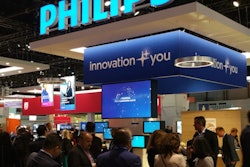
Philips Healthcare parent Royal Philips has unveiled two healthcare projects backed by the U.K. government that promise to accelerate the development of artificial intelligence (AI) software to support cancer diagnostics.
The initiative forms part of major cross-sector collaborations with the U.K.'s National Health Service (NHS), academia, and industry partners from the U.K. government's Industrial Strategy Challenge Fund, delivered through United Kingdom Research and Innovation. A central aim is to fully digitize a number of NHS pathology laboratories, expanding access to digital pathology services in the U.K.
Philips will be the principal partner on the major cross-sector collaboration project Pathology Image Data Lake for Education, Analytics and Discovery (PathLAKE), which has received 10 million pounds (11.4 million euros) of government funding to develop AI in pathology, according to a press statement.
Project PathLAKE partners from University Hospitals Coventry and Warwickshire NHS Trust and teaching hospitals and universities at Warwick, Belfast, Oxford, and Nottingham will embed and demonstrate the diagnostic efficiency of digital pathology, computer-aided testing of pathology samples, and develop AI tools for personalized medicine.
The scheme will create a secure data lake of tens of thousands of professionally annotated images for building deep-learning algorithms that can automatically detect cancer. These images and tools will be made available across the consortium including a growing number of small to medium enterprise partners.
Philips will also be investing in Glasgow's Queen Elizabeth University Hospital as part of project Industrial Centre for Artificial Intelligence Research in Digital Diagnostics (iCAIRD), a pan-Scotland consortium led by the University of Glasgow and comprised of partners across the NHS, academia, and industry. Project iCAIRD will develop infrastructure whereby AI researchers can assess digital diagnostics, pathology, and radiology data within existing national initiatives. This will create one of the largest fully digitized pathology laboratories in Europe, Philips said.
The project will establish a national pathology image archive as an open-standard, accessible, and scalable resource. Philips will provide AI tools, software, and expertise. Philips digital pathology technology together with AI will be used by clinicians to help facilitate earlier and more definitive diagnosis of gynecological cancers, for instance.
Both projects are three years in duration and initial activities will begin in December 2018.


















